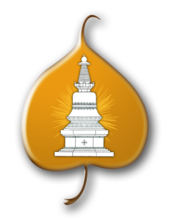Sangha Support and Offerings
![]()
Students have the amazing opportunity to make offerings to the monks and nuns who serve Kadampa Center, and it's incredibly rare to have so many at one Center in the US! Since the sangha are holding so many vows, serving them is an opportunity to create HUGE merit. For the sangha who are here only as volunteers (currently three nuns), it also helps support their basic needs so they can live here, attend and serve the Center.
For International Sangha Day in 2012, our director, Robbie Watkins, led a discussion about ways to interact with and support our sangha. You can listen to this very informative and answers a lot of questions, so you can listen to the recording here.
Examples of Ways to Make Offerings
-
Helping pour and serve them drinks at all the classes and rituals, cleaning the cups after, etc. No sign up is required – just ask the Spiritual Program Coordinator (SPC), Assistant SPC, or anyone you see bringing the drinks in the gompa to show you what to do.
-
Make kata (traditional white scarf) offerings. This is typically done with the hands in a prayer mudra. The kata should be folded in half (long ways). If the opening is towards the teacher, you wish to always to open to the teachings; if the fold is towards the teacher, you wish to remain close to the teacher until enlightenment. It is very auspicious to offer a kata to the Buddhas on any altar, by draping it on the statues. If you offer a kata to a qualified teacher or lama, they put the kata over your head as a blessing. When offering a kata to anyone else (monks and nuns who are not teachers, lay people, etc.), traditionally they keep the kata. Katas are available for purchase in the bookstore. Since it is an offering, it is best that you buy it rather than borrow one. If you forget to bring one, it is better to borrow one than not to offer at all.
-
Make monetary or gift offerings at any program during the dedications, but especially at pujas, on holy days, and on special occasions. Put any money offering in an envelope, and depending on the circumstances put it on their table or present it while carrying a kata. Typically a teacher will not take an envelope of money directly from you – an attendant will take it, or you just place it on their side table. This is because a qualified teacher should not be concerned with material gifts, so this helps prevent the knowledge of who is giving money, but you still get all the merit!
-
Lama Tsongkhapa says the best offering to a teacher is your practice. You can write a card to your teacher to say how you are putting the dharma into practice and seeing a positive difference – the best gift of all! (It's recommended to use a pretty card without a Buddha image, since holy images can't later be burned or thrown away.)
-
Offer your talents. Since sangha typically don’t have a lot of money, they rely on gifts of service as well. These can range from small gestures like a ride, meal, or errand, to big services like offering housing, major repairs, professional services – and everything in between. If you don’t know if a service is needed by our sangha but would like to offer your talents, please talk with the SPC, Assistant SPC, or email program@kadampa-center.org
Offerings of katas, money, gifts, and cards can be done anytime. One of the best opportunities is during the dedications after a teaching, puja, retreat, or practice. It doesn’t have to be a special day, and you don’t have to wait for anyone else – just walk right up and offer! It’s also traditional when a teacher returns after a long trip, or a visiting lama arrives, to line up with katas as a welcoming offering.
Individual Offerings via PayPal
When meeting in person, we have many opportunities to practice generosity by making offerings to our ordained sangha, such as during pujas and other events. These offerings are precious connections with our geshes and nuns as well as incredible opportunities to practice the perfection of generosity. Many members have asked about how they can continue to make these offerings in small but meaningful ways.
In response, we are happy to let you know that many ordained sangha have PayPal accounts. Those who wish to make offerings can continue do so, just without physical envelopes and money.
The sangha PayPal accounts are not Kadampa Center accounts, and offerings are not tax-deductible, but considered a “friend to friend” transition. Donations to the Kadampa Center are separate, and those donations are essential continue to fund Center operating expenses that support our precious geshes, including salaries and housing allowances.
To make offerings to sangha via PayPal, use the links provided below to access the individual sangha member’s personal PayPal account. Simply transfer funds from your PayPal account using a ‘gift to a friend.’ As with the puja offerings, any heartfelt amount offered is beneficial.
We hope that this information is beneficial for those who have enjoyed this practice of generosity and connection. You may give as much or little as desired and as often as desired. We will maintain this method since it may remain a convenient way to make a connection with sangha and practice generosity for those who do not often carry cash and envelopes to the center!
-
To make offerings via PayPal to either Geshe Gelek or Geshe Sangpo, click here: Geshe PayPal offering (or offerings can be made in person via cash in an envelope)
-
To make offerings via PayPal to Venerable Khando, click here: Khando-la PayPal offering (or offerings can be made in person via cash in an envelope)
-
To make offeirngs via PayPal to Venerable Choekyi, click here: Choekyi-la PayPal offering (or offerings can be made in person via cash in an envelope)
-
To make offerings to Venerable Lhamo: financial offerings can be made via cash in an envelope
Long Term Support
Sangha take ordination in order to focus on Dharma practice and study, so are encouraged not to work conventional jobs. Western culture doesn't have the same history of supporting sangha and Buddhist organizations like in Tibet, India, China, Singapore, etc. It is a struggle for the sangha pioneers to afford to live and practice in the states. Most centers don't have big enough budgets to support sangha who attend, so many of the monks and nuns live with their family or very kind lay hosts. The long term view would be monasteries and nunneries, designed according to the needs of the sangha, all over the country, which will require sponsors and volunteers to make it a reality! FPMT has an organization, the International Mahayana Institute, dedicated to supporting FPMT sangha. The IMI Lama Yeshe Sangha Fund helps provide schoarships so sangha can afford to attend important teachings and retreats. They are also actively exploring how better to support sangha who are aging, and are always need of expertise and funds to help support all their efforts.



